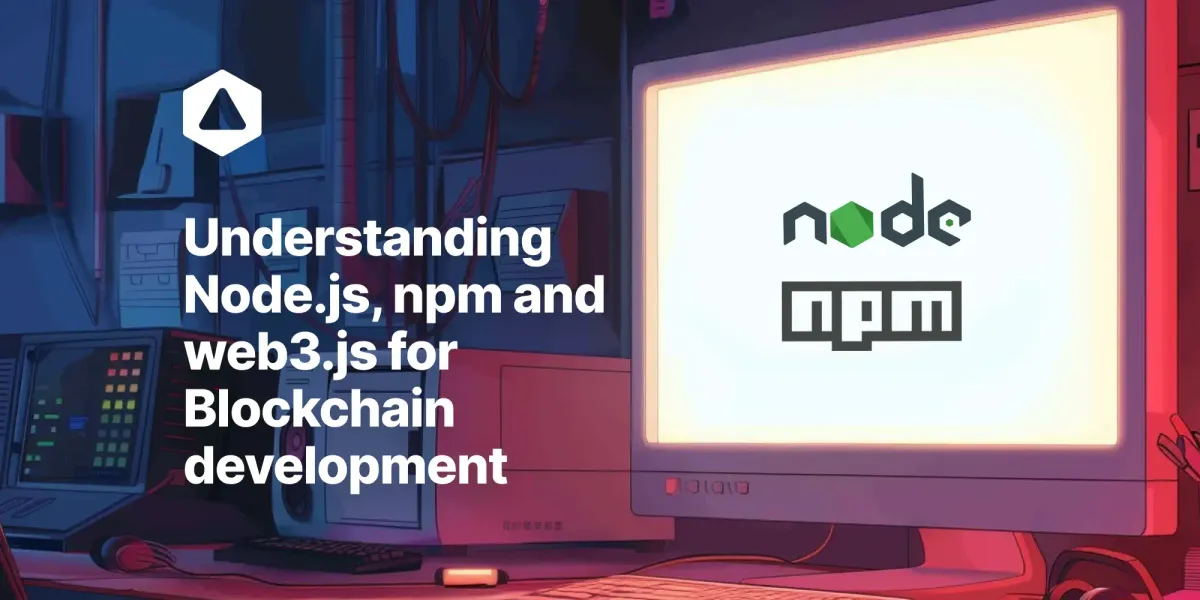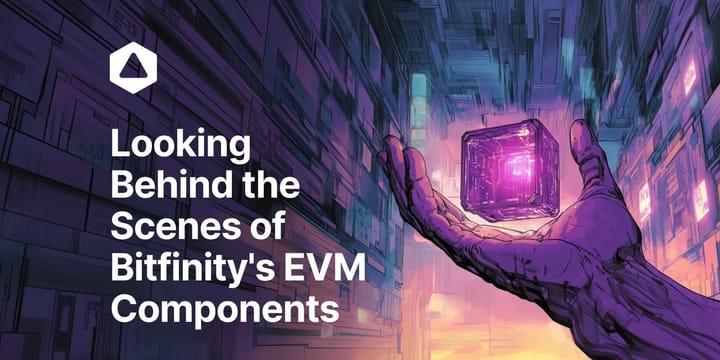Understanding Node.js, npm, and Web3.js for Blockchain Development

Node.js and npm are important tools in modern web development, offering a rich set of features that empower developers to build robust, scalable applications. This guide delves into the essential aspects of Node.js and npm, providing a detailed understanding of their capabilities and advantages. It will also focus on integrating Web3.js for blockchain development and how it relates to Bitfinity Network.
Node.js: The JavaScript Runtime
Node.js stands out due to its asynchronous, event-driven architecture. This design allows Node.js to handle multiple operations simultaneously, making it ideal for applications requiring real-time updates, such as chat applications, online gaming, and live streaming services. The non-blocking nature of Node.js ensures that the system remains responsive and efficient even under heavy load.
Single-Threaded Event Loop
While Node.js operates on a single thread, it leverages an event loop to manage numerous concurrent connections. This approach contrasts with traditional multi-threading, where each task is handled in a separate thread. The single-threaded model of Node.js reduces overhead and complexity, leading to better performance and scalability.
Built-in Core Modules
Node.js includes a variety of built-in core modules that provide essential functionalities out-of-the-box. These modules cover a wide range of operations, including HTTP, HTTPS, file system interactions, and data streams. Utilizing these core modules minimizes the need for additional libraries, streamlining the development process and enhancing security.
Scalability
Node.js supports horizontal scaling through clustering, enabling multiple Node.js processes to share the same server port. This feature is crucial for applications that need to handle a growing number of users, allowing them to scale efficiently without significant reengineering.
npm: Node Package Manager
npm, the Node Package Manager, is a critical tool for Node.js developers. It provides access to the largest ecosystem of open-source libraries in the world. With over a million packages available, npm offers solutions for almost any problem, from utility functions to full frameworks. This extensive repository accelerates development and fosters innovation by enabling developers to build on existing work.
Package Management
The package.json file is at the heart of every Node.js project. This file contains metadata about the project, lists its dependencies, and defines custom scripts for automating tasks. Managing dependencies through package.json ensures that the correct versions of libraries are used, promoting consistency across different environments and stages of development.
Security Auditing
npm includes a robust security auditing tool, npm audit, which scans project dependencies for vulnerabilities. By identifying and addressing security issues early, developers can maintain a secure codebase, crucial for applications handling sensitive data.
Global and Local Installations
npm allows for both global and local package installations. Global packages, installed with the -g flag, are accessible from any project on the system, providing tools and utilities that are needed across multiple projects. Local packages are installed within a specific project directory, ensuring that different projects can use different versions of the same package without conflicts.
Custom Scripts and Automation
npm scripts, defined in the package.json file, enable automation of repetitive tasks. Common tasks such as running tests, building the project, or deploying applications can be automated, enhancing productivity and reducing the potential for human error.
Versioning and Dependency Management
npm uses semantic versioning to manage package versions, ensuring compatibility and stability. The package-lock.json file locks the versions of dependencies, ensuring consistent installations across different environments and preventing issues caused by version discrepancies.
Web3.js: Integrating Blockchain with Node.js
Web3.js is a JavaScript library that allows you to interact with the Ethereum blockchain. It provides a comprehensive set of features to interact with smart contracts, send transactions, and retrieve blockchain data.
Connecting to the Bitfinity Network
Web3.js can be utilized to connect to Bitfinity Network. This integration allows developers to harness Bitcoin's security and liquidity within Ethereum's programmable environment. By connecting Web3.js to Bitfinity, developers can interact with Bitcoin-based assets using familiar tools and languages designed for Ethereum, such as Solidity.
Interacting with Smart Contracts
Using Web3.js, developers can create instances of smart contracts on the Bitfinity Network, enabling seamless interactions between Bitcoin and Ethereum ecosystems. This opens up new possibilities for decentralized applications (dApps) that leverage Bitcoin's robustness while benefiting from Ethereum's versatile smart contract capabilities.
Integrating Node.js, npm, and Web3.js in Development
With Node.js, developers can use JavaScript for both client-side and server-side development. This unification simplifies the development process, enabling code reuse and a consistent development experience. Tools like Express.js, a minimalist web framework for Node.js, facilitate building robust server-side applications with ease.
Building Blockchain Applications
Node.js and Web3.js together form a powerful combination for developing blockchain applications. Whether you're building decentralized applications (dApps), integrating blockchain functionalities into existing systems, or creating financial platforms that require blockchain transactions, this integration provides a seamless development experience.
Real-Time Blockchain Data
Node.js’s event-driven nature makes it well-suited for real-time applications. Web3.js can be used to listen for blockchain events on the Bitfinity Network, providing real-time updates on transactions, smart contract interactions, and other blockchain activities. This is essential for applications like live cryptocurrency price trackers and blockchain explorers.
Indispensible Tools for Blockchain Development
Node.js, npm, and Web3.js are indispensable tools in the modern developer's toolkit. Node.js’s efficient, event-driven architecture, npm’s extensive package management capabilities, and Web3.js’s robust blockchain interaction features empower developers to build scalable, high-performance, blockchain applications.
If you are planning on building dApps on Bitfinity Network, Node.js, npm, and Web3.js provide the foundation you need to succeed.
Connect with Bitfinity Network
Bitfinity Wallet | Bitfinity Network | Twitter | Telegram | Discord | Github

*Important Disclaimer: The information on this website is provided for general informational purposes only and should not be considered financial advice. While we strive for accuracy, Bitfinity does not endorse and is not responsible for any errors or omissions or for results obtained from the use of this information. Views expressed herein may not reflect those of Bitfinity. External links are provided for convenience and verification of information is recommended before taking any actions based on content found here.





Comments ()